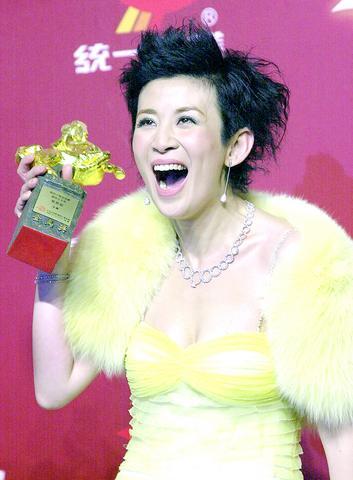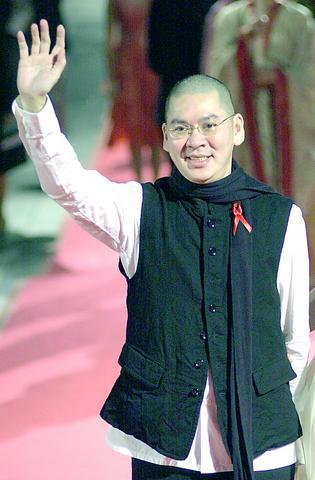The 40th Golden Horse Awards (
Hong Kong crime drama Infernal Affairs (

PHOTO: AFP
Tony Leung (

PHOTO: AP
Another star from Hong Kong, Sandra Ng (
An ecstatic Ng, while accepting the award said, "If you think my role in this movie was good, you should see me in the sequel."
Anthony Wong (
The honors for best director were handed to Andrew Lau (
"I was expecting to take at most four awards, so I'm really pleased with this result," Andrew Lau said at the end of the ceremony. But Alan Mak expressed disappointment that Andy Lau did not win the best lead actor and said he would write another film specifically for him.
Taiwanese director Tsai Ming-liang (
Goodbye, Dragon Inn and its partner film The Missing (
Chen Sheng-chang (
"I'm very thankful for the Central Motion Picture Corporation (CMPC), where I learned editing. Without the CMPC I wouldn't be here."
Liao Pen-jung (
Liao first worked with Tsai on Rebels of the Neon God in 1992 and worked with Tsai on each of the director's films since then. The Missing, which was directed by Tsai's protege Lee Kang-sheng (
Wang Baoqiang (
This year, despite Infernal Affairs dominance, the awards were quite evenly divided between Taiwan, Hong Kong and China and many awards were given to non-commercial films, in particular Taiwan's Goodbye, Dragon Inn and The Missing.
Last night, Tainan basked in the limelight, with the arrival of stars such as Andy Lau, Leon Lai (
The city's 300-year-old historical buildings, such as the Confucian Temple and Yi-tsai Gold Castle were specially decorated for the event.
The whole city came out in support of the awards. All the eateries famous for Tainan delicacies, many of which have been in business more than 100 years, donated their local snacks to guests. And even the betel-nut girls at stands near the Tainan interchange and Tainan airport all wore cheongsams, reportedly under pressure from the city's police, to welcome the event to the city.
Beginning at 2pm, fans of Andy Lau and Leon Lai -- mostly teenag girls -- lined up on the two sides of the red carpet in front of Tainan Cutural Center.
"Tonight I have to see Leon Lai and Lee Sin-jie (
The award ceremony also paid a special tribute to Taiwanese action actor Ke Shou-liang (

Taiwan has next to no political engagement in Myanmar, either with the ruling military junta nor the dozens of armed groups who’ve in the last five years taken over around two-thirds of the nation’s territory in a sprawling, patchwork civil war. But early last month, the leader of one relatively minor Burmese revolutionary faction, General Nerdah Bomya, who is also an alleged war criminal, made a low key visit to Taipei, where he met with a member of President William Lai’s (賴清德) staff, a retired Taiwanese military official and several academics. “I feel like Taiwan is a good example of

March 2 to March 8 Gunfire rang out along the shore of the frontline island of Lieyu (烈嶼) on a foggy afternoon on March 7, 1987. By the time it was over, about 20 unarmed Vietnamese refugees — men, women, elderly and children — were dead. They were hastily buried, followed by decades of silence. Months later, opposition politicians and journalists tried to uncover what had happened, but conflicting accounts only deepened the confusion. One version suggested that government troops had mistakenly killed their own operatives attempting to return home from Vietnam. The military maintained that the

Before the last section of the round-the-island railway was electrified, one old blue train still chugged back and forth between Pingtung County’s Fangliao (枋寮) and Taitung (台東) stations once a day. It was so slow, was so hot (it had no air conditioning) and covered such a short distance, that the low fare still failed to attract many riders. This relic of the past was finally retired when the South Link Line was fully electrified on Dec. 23, 2020. A wave of nostalgia surrounded the termination of the Ordinary Train service, as these train carriages had been in use for decades

Lori Sepich smoked for years and sometimes skipped taking her blood pressure medicine. But she never thought she’d have a heart attack. The possibility “just wasn’t registering with me,” said the 64-year-old from Memphis, Tennessee, who suffered two of them 13 years apart. She’s far from alone. More than 60 million women in the US live with cardiovascular disease, which includes heart disease as well as stroke, heart failure and atrial fibrillation. And despite the myth that heart attacks mostly strike men, women are vulnerable too. Overall in the US, 1 in 5 women dies of cardiovascular disease each year, 37,000 of them